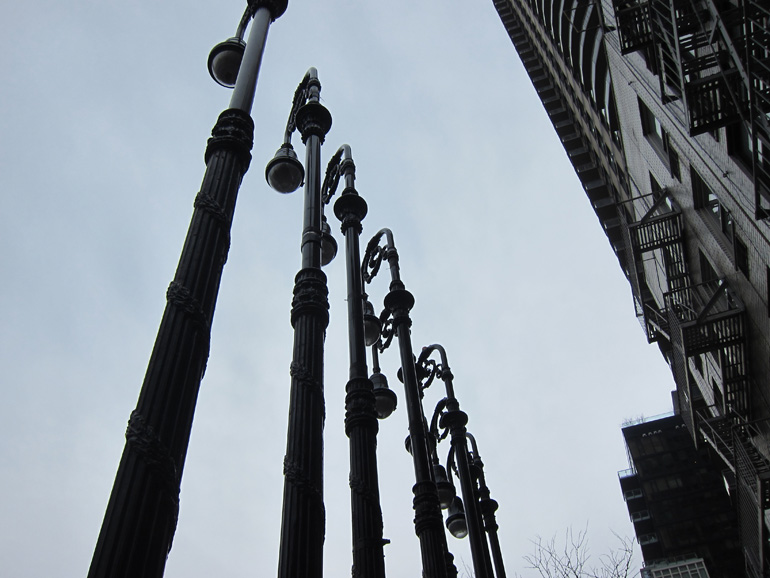Gotham Diary:
Blanquette
27 January 2012
Before I go any further, I have to confess that there was a moment in time, long before I had made blanquette de veau for myself, when I wondered if “blanquette” were not some very old loan word from the English “blanket,” the blanket of veal being the ribs. Cuddly, no? Happily, the Internet came along presently, and put an end to such armchair speculations.
I’m in a very good mood this morning, because I had such a treat last night — and not late last night, either. The minute I got home after seeing The Artist, I ordered as many Jean Dujardin videos as I could (quite a few of them are not available here and not for sale to Americans). The first to arrive was OSS 117: Cairo, Nest of Spies. I knew that it was supposed to be a spoof, but I wasn’t expecting to be amused; all I wanted was the perspective of seeing this amazing actor in another movie. As it turns out, Michel Hazanavicius, who directed both OSS 117 and The Artist (he also wrote the latter’s screenplay), borrowed a lot of business from the earlier movie for the later one. He simply removed the clowning-around. Now, I’m one of those consommateurs de rosbif who finds French clowning-around to be sillier, as a rule, than it is funny — which is to say, embarrassing. And OSS 117 starts off — after a parody of a wartime army adventure series that brings Indiana Jones to mind (also Mulholland Falls) with a somewhat dopey make-out scene that, especially given its lackluster production values, isn’t promising. It takes a little while for M Dujardin to establish the coocoo genius of his send-up of the young Sean Connery. Once he does, the pleasure of OSS 117 becomes absolutely wicked.
Jean Dujardin doesn’t look like Sean Connery, really, but then he doesn’t not look like him, either. His face, at rest, is more Gallic than Celtic, but it is just as bland. Agent 117 may be an idiot, but he is just as nonchalant as 007. Every now and then, it’s true, the sangfroid gives way to the This-is-so-cool-I-can’t-believe-it’s-happening effervescence of a twelve year-old who is not quite ready for sex, and these moments of expressive helplessness are just about the funniest thing I’ve seen in the movies in a long time. Actually, I can think of only one comedian whose work is as thrilling: Sid Caesar. When M Dujardin leans in on Mlle Béjo (also in OSS 117) and thanks her for teaching him — the mambo! the joke is almost too demented to be funny. I died laughing anyway.
And let’s not forget the scene in which Agent 117, disturbed in his slumbers by the call of a muezzin, does something about it. As he later wails, “What did I say?”
Too much fun, really. After watching the movie before dinner, I played the best bits for Kathleen before bedtime. I made another discovery. The charm of OSS 117 and The Artist flows largely from Jean Dujardin’s ability to channel the visual impact of classic cinema. Classic television as well: I’d be very surprised to learn that neither the actor nor his director is familiar with Sid Caesar’s “Aggravation Boulevard.” But while we’re looking backward, whether to the silent era or to the denatured color of the early Bond films, something unwittingly prescient happens. When M Dujardin isn’t wearing a moustache, that impossibly broad smile of his, displaying an unnervingly saurian array of teeth, Jon Hamm comes to mind.
***
I am going to recommend Clay Johnson’s The Information Diet to everyone. It makes an important argument for refashioning intellectual life in American democracy, and in all but one respects it is admirably concise. I’m going to hope, however, that someone will re-present this issue without that one respect, the argument from food. Now, I understand that many readers, especially younger ones, are going to be very effectively stimulated by the analogies that Johnson works between what we put in our stomachs and what we put in our brains. Health-conscious readers who have considered going vegan will be enthused by Johnson’s concept of infoveganism. But I find it off-putting, especially the harping on “information obesity.” In the end, food and information are not usefully comparable.
We need food to stay alive, and the food that we don’t need in order to stay alive tends to make us obese and otherwise unhealthy. There is no corresponding reason to watch your intake of information. We don’t convert information into calories; on the contrary, we expend calories in the maintenance of information. The reasons for discriminating among sources of information are intellectual, and pushing the dietary analogy tends to oversimplify what minds are for. The Information Diet has nothing to say about art and literature, which, I shouldn’t be surprised to learn, Johnson, as a political operative with a keen sense of the irrationality of sports, regards as forms of “entertainment.” It is hard to see a place for the novels of Henry James in his book’s regimen. Somebody needs to attack this vital subject without the alimentary armature.

